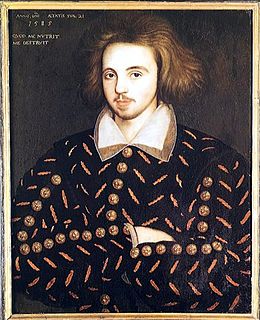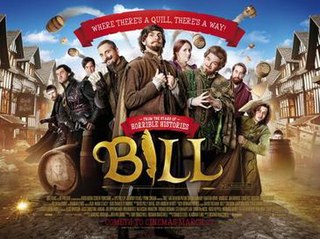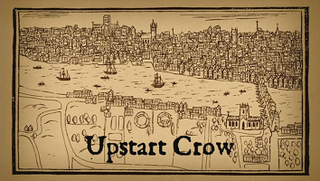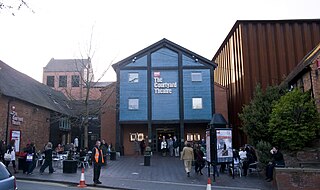Plot
Act One
In Scadbury Park, the home of Thomas Walsingham, Marlowe engages in a mock incantation to his personal deity Dog. He discusses his religious scepticism with Walsingham and Kyd. They introduce an actor called Tom Stone who will be performing for them in tandem with Rosalinda, a mixed-race Italian actress who is in love with Marlowe. Marlowe and Rosalinda are suspicious of Stone, who asks a lot of questions. Rosalinda is convinced she has seen him before. Walter Raleigh arrives to witness the performance. They discuss art, politics and religion while watching Stone and Rosalinda act in a risqué satire written by Marlowe. Afterwards Stone queries Kyd about the ‘school of night’, an allegedly atheistic and subversive secret society to which Raleigh, Walsingham and Marlowe belonged. Kyd tells Stone that it was supposed to have promoted republicanism. He also tells him about Marlowe's early career as a spy. Marlowe and Rosalinda reappear and confront Stone. They have discovered that his real name is Shakespeare, author of the Henry VI plays. He explains that he is using a stage name, but they are unconvinced. Shakespeare tells Marlowe he is working on a poem, Venus and Adonis. Marlowe is surprised by the similarity to his own new project Hero and Leander. Kyd decides to leave Scadbury.
Scadbury Park is a Local Nature Reserve in Chislehurst in the London Borough of Bromley. It is also a Site of Metropolitan Importance for Nature Conservation. It is over 300 acres, and is part of an extensive wildlife corridor together with Petts Wood and the Jubilee Country Park.
A day later: Shakespeare has been in bed with Rosalinda. Marlowe enters and reads some lines from Shakespeare’s new poem. He is disturbed by its power. He and Shakespeare discuss literature. Walsingham informs Marlowe that his indiscreet declarations of heretical opinions can get them all in trouble. Raleigh has already been arrested on the unrelated charge of marrying illegally, but they are all coming under suspicion. In London Skeres and Poley burst into Kyd’s rooms and arrest him, looking for documents believed to be held by Marlowe on the 'school of night'.
Act Two
A commedia dell'arte performance is held at Scadbury. Shakespeare argues that opinion gets in the way of art. Marlowe is disconcerted by Shakespeare's views. Horsemen arrive to arrest Marlowe.

Commedia dell'arte was an early form of professional theatre, originating from Italy, that was popular in Europe from the 16th to the 18th century. Commedia dell'arte is also known as commedia alla maschera, commedia improvviso, and commedia dell'arte all'improvviso. Commedia is a form of theatre characterized by masked "types" which began in Italy in the 16th century and was responsible for the advent of actresses and improvised performances based on sketches or scenarios. A commedia, such as The Tooth Puller, is both scripted and improvised. Characters' entrances and exits are scripted. A special characteristic of commedia dell'arte are the lazzi. A lazzo is a joke or "something foolish or witty", usually well known to the performers and to some extent a scripted routine. Another characteristic of commedia dell'arte is pantomime, which is mostly used by the character Arlecchino (Harlequin).
In London, Marlowe is visited in prison by Raleigh who tells him he has been denounced as a blasphemer. Raleigh says he can free Marlowe, but he wants to be sure that Marlowe has no incriminating records of the meetings of the school of night. Marlowe insists there are none. He is freed.
In the Rose theatre Shakespeare reads one of the Dark Lady sonnets he has written about Rosalinda. They are hiding there with Marlowe. Skeres and Poley arrive. Shakespeare attempts to fight them, but Marlowe assures him they are friends. They tell Marlowe that they have a plan to get him away. They will meet at Deptford, where they will have a body resembling Marlowe. They will claim he drowned in the river, while Marlowe escapes overseas. Marlowe tells Rosalinda that he has hidden the records of the school of night at Scadbury. She is to get them and then meet him in Venice. Shakespeare is suspicious of the escape plan, and suggests that Marlowe travel by another route. However, he agrees to allow Marlowe's 'posthumous' works to be published in his name.
At Deptford, Marlowe, Frizer, Poley and Skeres discover that the man whose body they have been given died from a stab wound. They decide to improvise a new plan according to which Marlowe will be killed in a fight. Frizer will be the killer and the others will say he acted in self-defence. Marlowe is now very suspicious. He abuses Frizer and threatens him with a knife. He forces Skeres to swear that there is no plan to kill him. Frizer, infuriated, twists Marlowe's arm back, stabbing him with his own knife. Skeres and Poley are horrified. Marlowe dies.
Shakespeare and Rosalinda visit Marlowe's grave in Deptford. Rosalinda is still convinced that all went as planned and she will meet Marlowe in Venice. Shakespeare says she must prepare herself for the possibility that Marlowe is dead.
In Shakespeare Survey, Jill L. Levinson, says that Whelan creates an "elusive Shakespeare, gifted and influential" and that the play weaves together references to "more than half a dozen scripts from Henry VI to Othello." [1] The Hollywood Reporter complained that the play was far too heavy on exposition, but that "Whelan does capture the spasms of desperation which seize the seeming cabal of doomed and threatened dramatists as they careen through history's obscure plots and even more obscure subplots. If Whelan's version of Marlowe were intended to be a James Bond of the late 16th century, however, it misses the mark by a wide margin." [2] Ian Shuttleworth for City Limits also complained about the expositions: "Half the evening seems given over to brute exposition, with characters informing each other of developments offstage, the byzantine intrigues of court or questions of religion and succession. It felt written for the specific press-night milieu of Stratford habitués." [3]
This article presents lists of the literary events and publications in 1593.

The School of Night is a modern name for a group of men centred on Sir Walter Raleigh that was once referred to in 1592 as the "School of Atheism". The group supposedly included poets and scientists Christopher Marlowe, George Chapman, Matthew Roydon and Thomas Harriot.

Ruled Britannia is an alternate history novel by Harry Turtledove, first published in hardcover by New American Library in 2002.

The Marlovian theory of Shakespeare authorship holds that the Elizabethan poet and playwright Christopher Marlowe was the main author of the poems and plays attributed to William Shakespeare. Rather, the theory says Marlowe did not die in Deptford on 30 May 1593, as the historical records state, but that his death was faked.
Ingram Frizer was an English gentleman and businessman of the late 16th and early 17th centuries who is notable for his reported killing of the playwright Christopher Marlowe in the home of Eleanor Bull on 30 May 1593. He has been described as "a property speculator, a commodity broker, a fixer for gentlemen of good worship" and a confidence trickster gulling "young fools" out of their money.
John Leslie Hotson, commonly known as Leslie Hotson or J. Leslie Hotson was a scholar of Elizabethan literary puzzles.
Annie Doris ("Dolly") Walker-Wraight was a British school teacher and writer, notable for her support of Marlovian theory, the view that Christopher Marlowe was the true author of Shakespeare's works.
Eleanor Bull was an English woman who is known for owning the establishment in which Christopher Marlowe, the Elizabethan playwright and poet, was killed in 1593.
Nicholas Skeres was an Elizabethan con-man and government informer—i.e. a "professional deceiver"—and one of the three "gentlemen" who were with the poet and playwright Christopher Marlowe when he was killed in Deptford in May 1593. Together with another of the men there, Robert Poley, he had played a part in the discovery of the Babington plot against the life of the Queen in 1586, and at the time of Marlowe's death was engaged in a money-lending swindle with the third of them, Marlowe's reported killer Ingram Frizer.

The Big Bang is a 2011 American action thriller film written by Erik Jendresen and directed by Tony Krantz, starring Antonio Banderas and Sienna Guillory.
Robert Poley, or Pooley was an English double agent, government messenger and agent provocateur employed by members of the Privy Council during the reign of Queen Elizabeth I; he was described as "the very genius of the Elizabethan underworld". Poley is particularly noted for his central role in uncovering the so-called Babington plot to assassinate the Queen in 1586, and for being a witness of, and even a possible party to, the reported killing in self-defence by Ingram Frizer of the famous poet/dramatist Christopher Marlowe in May 1593.
Wilbur Gleason Zeigler was a lawyer and writer who is best known for founding the Marlovian theory of Shakespeare authorship in the preface and notes to his 1895 novel It Was Marlowe. He also wrote on the history of Ohio, the culture North Carolina, and the San Francisco earthquake of 1906, of which he was a survivor.

Bill is a 2015 British family adventure comedy film from the principal performers behind children's TV series Horrible Histories and Yonderland. It was produced by Punk Cinema, Cowboy Films and BBC Films and was released in the UK on 18 September 2015 by Vertigo Films. The film is a fictional take on the young William Shakespeare's search for fame and fortune, as written by Laurence Rickard and Ben Willbond and directed by Richard Bracewell who co-produced with Tony Bracewell, Alasdair Flind and Charles Steel. It features the six lead performers playing several different roles each including Mathew Baynton, Martha Howe-Douglas, Ben Willbond, Simon Farnaby, Jim Howick and Laurence Rickard. Bill has received mostly positive reviews from critics and grossed $968,534 worldwide. The film also received nominations for the Evening Standard British Film Award for Award for Comedy and the Into Film Award for Family Film of the Year.

Upstart Crow is a British sitcom which premiered on 9 May 2016 at 10pm on BBC Two as part of the commemorations of the 400th anniversary of the death of William Shakespeare. Its title quotes "an upstart Crow, beautified with our feathers", a critique of Shakespeare by his rival Robert Greene in the latter's Groats-Worth of Wit.

Christopher Marlowe, English playwright and poet, has appeared in works of fiction since the nineteenth century. He was a contemporary of William Shakespeare, and has been suggested as an alternative author of Shakespeare's works, an idea not accepted in mainstream scholarship. Marlowe, alleged to have been a government spy and frequently claimed to have been homosexual, was killed in 1593.
This page is based on this
Wikipedia article Text is available under the
CC BY-SA 4.0 license; additional terms may apply.
Images, videos and audio are available under their respective licenses.












